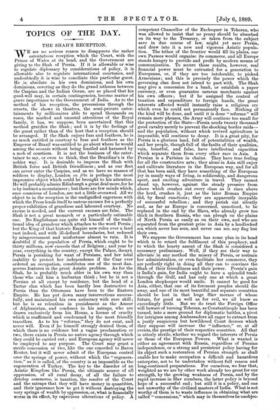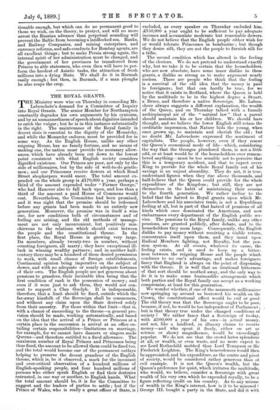TOPICS OF THE DAY.
THE SHAH'S RECEPTION.
WE see no serious reason to disapprove the rather ostentatious reception which the Court, with the Prince of Wales at its head, and the Government are giving to the Shah of Persia. If it is allowable or wise to regulate diplomacy by considerations of policy, it is allowable also to regulate international courtesies, and undoubtedly it is wise to conciliate this particular guest. He is absolute in his own dominions, and his own dominions, covering as they do the grand isthmus between the Caspian and the Indian Ocean, are so placed that his good-will may, in certain contingencies, become matter of grave importance to the Government of India. As to the method of his reception, the processions through the streets, the shows in theatres, the semi-private enter- tainments by millionaires able to spend thousands on roses, the marked and unusual attentions of the Royal family, it has, we suppose, been ascertained that this method gratifies the Shah ; and it is by the feelings of the guest rather than of the host that a reception should be arranged. If the Shah enjoys fuss and feathers, he is as much entitled in courtesy to fuss and feathers as the Emperor of Brazil was entitled to go about where he would among the savants without being hustled and harassed by a mob of courtiers. It is not the business of the enter- tainer to say, or even to think, that the Brazilian's is the nobler way. It is desirable to impress the Shah with British force and British friendliness ; and as our fleet can never enter the Caspian, and as we have no masses of soldiers to display, London en fête is perhaps the most impressive object which could be brought to his attention. He will probably admire Edinburgh a great deal more, for he is by instinct a mountaineer ; but there are few minds which, once conscious of London, are not a little overawed. All we object to in the reception is the undignified eagerness with which the Press lends itself to untrue excuses for a perfectly proper exhibition of grandiose and laboured courtesy. No excuse is needed, and the current excuses are false. The Shah is not a great monarch or a particularly estimable one. No Englishman can quite rid himself of the tradi- tional idea of grandeur which attaches to the word Persia ; but the King of that historic Empire now rules over a land vast indeed, and with ill-defined boundaries, but reduced by misgovernment and misfortune almost to ruin. It is doubtful if the population of Persia, which ought to be thirty millions, now exceeds that of Belgium ; and year by year, everything in the country, except the Palace, decays. Persia is perishing for want of Persians, and her total inability to protect her independence if the Czar ever ordered an occupation, constitutes one of the most dan- gerous features in the great Asiatic problem. As for the Shah, he is probably much abler in his own way than those who call him a barbarian think ; but he is not a Persian at all except by residence, but the head of a Tartar clan which has been hardly less destructive to Persia than the Ottomans have been to the Eastern Empire. He has put down many insurrections success- fully, and maintained his own autocracy with rare skill ; but he is as relentless in punishment as the Ameer of Afghanistan, and condones in his satraps, who are drawn exclusively from his House, a license of cruelty which is reaffirmed and condemned by the most friendly travellers. As to his "reforms," they do not exist, and never will. Even if he himself strongly desired them, of which there is no evidence but a vague proclamation or two, there exists in Persia no native agency through which they could be carried out; and European agency will never be employed to any purpose. The Court may grant a sterile concession or two, like the one conceded to Baron Reuter, but it will never admit of the European control over the springs of power, without which the "regenera- tion," as it is called, of the country is as impossible as the regeneration of Turkey. The key to the disorder of an Asiatic Kingdom like Persia, the ultimate source of all oppression, of all rural decay, of all the failure to develop commerce, is taxation, the resolve of the Court and the satraps that they will have money in quantities, and their ignorance how to get it without destroying the very springs of wealth by oppression, or, what is financially worse in its effect, by capricious alterations of policy. A competent Chancellor of the Exchequer in Teheran, whhit was allowed to insist that no penny should be absorbed on its way to the Treasury, or taken from the subject save in due course of law, might yet save Persia, and draw into it a new and vigorous Asiatic popula- tion. The tribes of the frontier would fill its plains, our own Parsees would organise its commerce, and all Europe stands hungry to provide and profit by modern means of communication. To secure these results, however, real financial power must be entrusted for a generation to Europeans, or, if they are too intolerable, to picked, Armenians ; and this is precisely the power which the governing clan does not intend to part with. The Shah may give a concession for a bank, or establish a paper- currency, or even guarantee caravan merchants against his own officers ; but if he assigned the control of taxation and expenditure to foreign hands, the great interests affected would instantly raise a religious cry which even he could not permanently face. Nothing of the kind will be done, and until it is done " reforms " will remain mere phrases, the Army will continue too small for the protection of the State—Persia needs twenty thousand good cavalry merely to prevent the shocking border raids— and the population, without which revived agriculture is impossible, will continue to decay. It is a great pity, for Persia is a glorious land, full of potentialities of wealth, and her people, though full of the faults of their qualities,. vain, boastful, and false, have intellectual capacities which separate them from every other race in Asia. A Persian is a Parisian in chains. They have true feeling' for all the constructive arts ; they alone in Asia still enjoy and cultivate literature in the European way, and for all that has been said, they have something of the European joy in manly ways of living, in soldiership, and dangerous sport, and exciting adventure in travel. They cannot stand up, however, against the steady pressure from_ above which crushes out every class as it rises above the herd, crushes it, just as the later Roman Empire did, by fiscal exactions ; they are apparently incapable of successful rebellion ; and they perish out silently and, as far as Europe is concerned, unnoticed, to be- replaced in the end by the Slays, who already grow too, thick in Southern Russia, who can plough on the plains of North Persia as easily as on their own, and who are separated from the greatest prize in Asia by a landlocked sea which never has seen, and never can see, any flag but their own.
We suppose the Government has some plan in its head which is to retard the fulfilment of this prophecy, and to which the hearty assent of the Shah is considered a necessary preliminary. Well, if they see their way to alleviate in any method the misery of Persia, or restrain her administration, or even facilitate her commerce, they are perfectly right in doing all they can to convince the Shah of their friendliness and their power. Persia's gain is India's gain, for India oukht to have a splendid trade through the Gulf, and has only one at which a great London shopkeeper would smile. It cannot be good for Asia, either, that one of its foremost peoples should die away, and one of its most beautiful and separate countries should be lost in that huge Slav morass of whose future, for good as well as for evil, we all know so exceedingly little. But we do trust the Foreign Office will beware of turning Teheran, as Constantinople has been turned, into a mere ground for diplomatic battles,-a pivot for intrigues among Ambassadors all eager to extract from a justly suspicious but bewildered Court decrees which they suppose will increase the "influence," or, at all events, the prestige bf their respective countries. All that is utterly sterile, whether we regard the interests of Persia or those of the European Powers. What is wanted is either an agreement with Russia, regardless of Persian independence, or a strong and persistent policy having for its object such a restoration of Persian strength as shall enable her to make occupation a difficult and hazardous enterprise, not to be undertaken without full reason and long-continued preparations. For ourselves, we fear that, weighted as we are by other work already too great for our strength, by the growing weakness of Persia, and by the rapid increase in Slav numbers, the latter policy is beyond hope of a successful end; but still it is a policy, and one not unworthy of the civilised masters of India. What is not worthy of them is to waste influence in obtaining what are called "concessions," which may in themselves be unobiee- tionable enough, but which can do no permanent good to those we wish, on the theory, to protect, and will no more arrest the Russian advance than perpetual sounding will prevent the Baltic from becoming a landlocked sea. Banks, and Railway Companies, and mining enterprises, and currency reforms, and safe-conducts for Bombay agents, are all excellent things ; but to make Persia strong again, the internal spirit of her administration must be changed, and the government of her provinces be transferred from Princes to able statesmen, who even then will have to per- form the hardest of Asiatic tasks, the attraction of fresh millions into a dying State. We shall do it in Burmah easily enough ; but then, in Burmah, if a man ploughs he also reaps the crop.











































 Previous page
Previous page